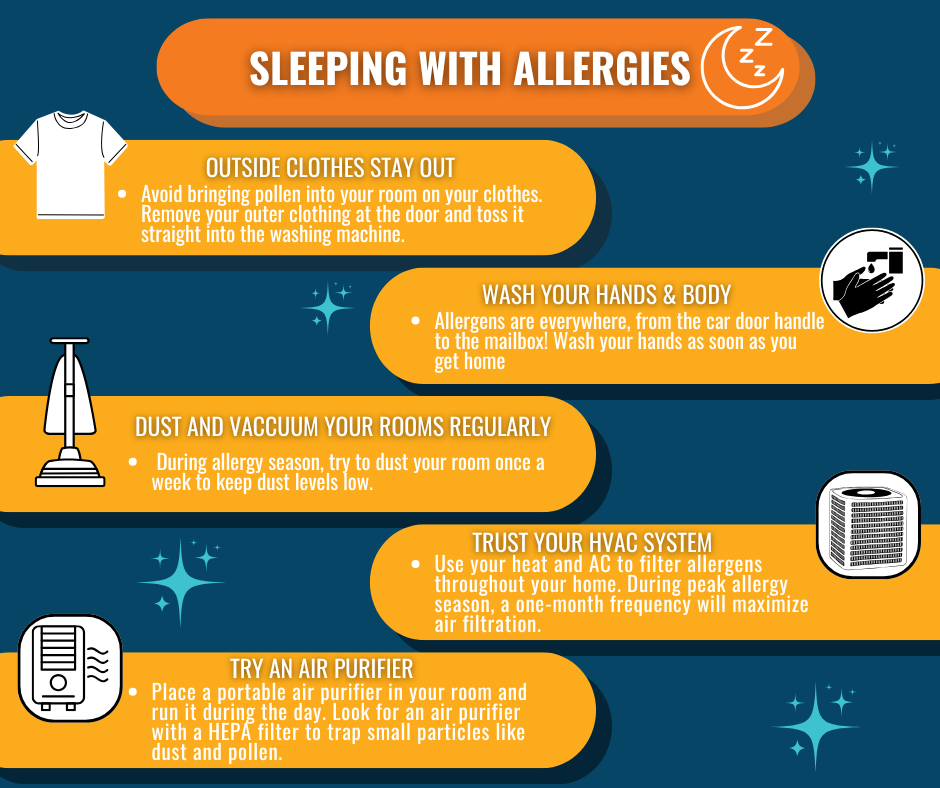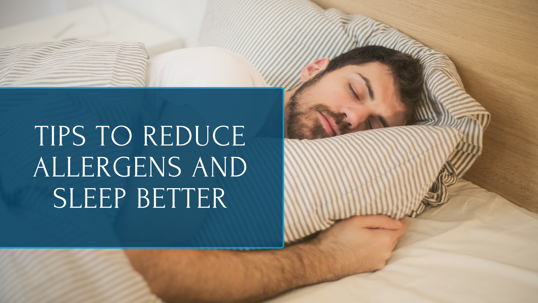People with allergies in central Florida are all too familiar with the challenges of nighttime symptoms: wheezing, coughing, tossing, and turning. Reducing exposure to indoor and seasonal allergens is critical to finding relief and getting a good night's sleep. Learn about the connection between allergies and sleep and practical solutions for preventing allergens in your bedroom.
Allergies and Sleep: What’s the Connection?
Did you know? Roughly40% of Americans have seasonal allergies–which means it’s likely that you or a loved one could be sleeping better. Interrupted or poor-quality sleep leads to fatigue and may even lead to an increased risk ofdeveloping a sleep disorder.
Because taking up residence in a bubble is unrealistic, we recommend doubling down on the habits and technologies that can help prevent indoor allergens. Unfortunately, it is not possible to create a completely allergy-free home. You can prevent allergens in your bedroom by cleaning and vacuuming, maintaining your HVAC system, and investing in a stand-alone air purifier.

![]()
How to Tackle Allergies in Your Bedroom
- Keep pollen out. During allergy season, keep windows and doors closed, especially from late morning to early evening when pollen levels peak.
- Shower at the end of each day. When you get home, remove your outer layers of clothing at the door and shower to get pollen off your skin and hair.
- Prevent dust accumulation in your bedroom. Dust and vacuum your bedroom weekly to stay ahead of dust, pollen, and other contaminants. You may need to dust your bedroom every other day if you have severe allergies.
- Keep pets out of your bedroom. Pet hair and dander are two of the most common indoor allergens. You can reduce your exposure by providing your pet with a cozy place to sleep in a separate room (or at least on the bedroom floor). And don’t forget to wash your pet’s bedding frequently!
- Maintain your HVAC system. A well-maintained HVAC system is the most effective tool for filtering particulates from the air inside your home. Maintain your unit annually and replace the filter at least every 1-3 months for maximum efficiency.
- Use an air purifier. Stand-alone air purifiers augment the filters built into your HVAC system. Add a HEPA filter air purifier to your routine to remove allergens from your home's air.
Read More: Best Ways to Improve Indoor Air Quality
Why Do My Allergies Get Worse at Night?
It’s not just you. Allergy symptoms are often worse at night because of:
- Histamine levels– Histamine is the chemical that triggers allergy symptoms inside your body. It tends to be present in higher concentrations at night.
- Pollen levels – Pollen naturally settles as the air cools in the evening; this means it falls on to you, your furniture, or the floors in your home.
- Body position – Lying down changes how mucus moves in your sinuses, which can cause mucus to gather in your nasal passages, leading to sneezing and coughing.
- Temperature changes – Temperature and humidity changes may affect nasal mucus production, contributing to irritation and post-nasal drip.
Take On Allergy Season with Help from Ace Solves It All
There’s no better investment than your home—and your family. Central Florida families turn to Ace Solves It All for expert indoor air quality services. Our experienced technicians have the skills and resources to maintain, repair, and improve your home’s HVAC system, keeping you comfortable at home.
Call 407-499-8006 orcontact us online to schedule HVAC, electrical, indoor air quality, or plumbing services in Kissimmee, Lakeland, and the surrounding areas.

